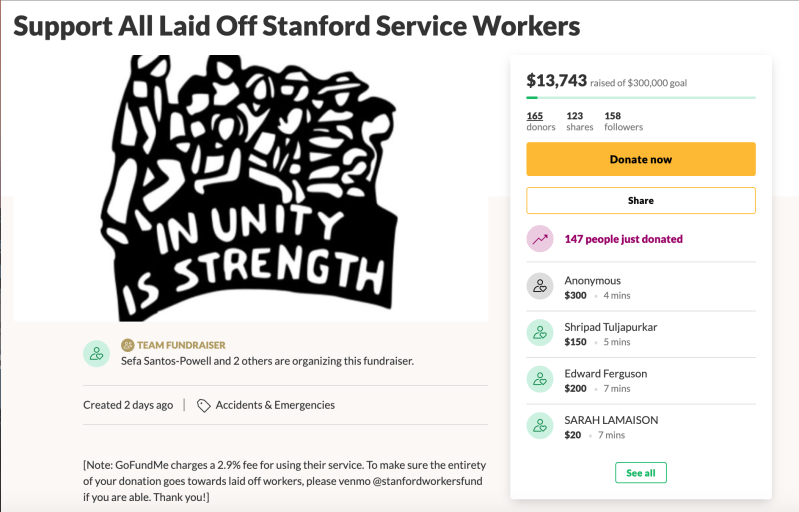Stanford students, alumni and other donors contributed $219,357 in three weeks for subcontracted staff and workers laid off in the wake of coronavirus-related facility closures. $101,462 of the total came from an emergency fundraiser conducted by Stanford Students for Workers’ Rights (SWR) over Venmo and GoFundMe, while the rest of the money was collected by individual campus houses for their respective staff members, according to SWR.
On March 16, Stanford committed to pay continuation for regular employees — now extended through April 30 for SEIU-represented direct hires — but excluded from this protection subcontracted staff who work on Stanford’s campus. As concern spread for subcontracted workers, SWR quickly organized a fundraiser to provide emergency compensation for Row kitchen staff employed by Student Organized Services (SOS).
After learning that more than 130 Stanford workers employed by the contracting organization UG2 will be laid off by April 30 without additional compensation, SWR suspended its first fundraiser and started a new GoFundMe and Venmo collection aimed at providing relief to workers contracted by UG2 as well as SOS.
SWR has taken to social media, op-eds and online petitions to “put as much pressure as we can on the University to start paying workers,” SWR organizer Kaitlyn Jong ’20 said.
SWR also called on alumni with significant online platforms to pressure the University to provide pay continuation for laid-off staff. In an Instagram post, the organization tagged alumni with “the resources and following to pressure [Stanford] into paying its workers,” including Sterling K. Brown ’98, Issa Rae ’07 and Rachel Maddow ’94.
SWR also targeted Julián Castro ’96 and his brother Representative Joaquin Castro (D-TX) ’96. Julián, a recent presidential candidate, tweeted the link to a Stanford Daily op-ed written by SWR members, commenting, “The custodians who clean classrooms and chefs who serve students meals are an integral part of Stanford’s campus. The university should support them, not cut their pay during a time of crisis.”
Joaquin, who represents the western half of San Antonio in Texas’ 20th district, tweeted a link to The Daily’s coverage of UG2 layoffs and wrote, “My grandmother worked as a maid, a cook, & a babysitter. Her hard work & sacrifices enabled [Julián] & I to attend Stanford.”
“I hope my alma mater & other universities pay contract workers such as janitors & chefs during COVID-19,” he continued.
A tweet by SWR also caught the eye of Stockton mayor Michael Tubbs ’12. Tubbs retweeted the message, adding, “Stanford has the resources and the values. They shouldn’t lay off workers, especially when I assume they were budgeted for in the beginning of this fiscal year.”
SWR’s dual strategy employs grassroots fundraising and outreach efforts aimed at spreading awareness and buy-in among Stanford affiliates, as well as high-level pressure on University officials to provide meaningful relief with the institution’s financial resources. The dual strategy was borne from a lack of clarity about “how long it will take the University to respond, if they do at all,” Jong said.
Despite increasing pressure from students, alumni and other affiliates, Provost Persis Drell is holding firm on Stanford’s stated policy for worker compensation. At a campus-wide virtual Q&A session, Drell said that the continuance policy results in part from Stanford’s decentralized decision-making structure, under which various units hire contractors at their discretion.
Drell noted that Stanford directly employs food service workers and residential custodians in campus dorms. As a result of the University’s commitment to “minimizing the impacts to [its] regular Stanford workforce,” Drell said, Stanford is “not in a position to extend commitments to all the employees of all of our contractors.”
SWR’s online messaging emphasizes the disparity between the University’s top salaries — several of which reach several million dollars per year — and its refusal to compensate its non-regular staff. One Instagram post includes a bar graph illustrating the amount of money SWR says Stanford would need to compensate workers through the spring — $1.71 million — and the 2018 salary of head football coach David Shaw ’94, $4.5 million. “Stanford can afford it,” reads the text below the graph.
SWR’s outreach messaging also highlights Stanford’s apparent outlier status among peer institutions on staff compensation. In a series of tweets, SWR compared Stanford’s $27.7-billion endowment to the smaller endowments of peer institutions who have promised to provide pay continuance, such as the University of Chicago, the University of Pennsylvania and MIT.
SWR organizer Nizhoni Begay ’20 told The Daily that such messaging is intended to show that Stanford “cannot pretend it doesn’t have the resources to support [its workers].”
SWR representatives expressed gratitude to individual donors and supporters but cautioned that only Stanford has the resources and power to provide a sufficient solution. “It will be nearly impossible for us to provide significant compensation for the growing number of workers being laid off,” Jong said.
The ultimate focus of the group’s efforts is to convince the administration to provide pay continuation for all workers.
To spur action, SWR is posting testimonials from students whose Stanford experiences were shaped by relationships with staff. One student quoted on SWR’s Instagram wrote, “Being away from home without my grandma and aunties there, it was incredibly meaningful to have [a particular dining hall staff member] there as someone who cared about me and showed it in her work and in our interactions.”
Other testimonials speak to staff members’ value to student life and the residential experience.
“We don’t do this because we feel ‘bad’ or want to ‘save’ these people,” Begay wrote. “This is what they are worth, and [our actions] are a critique of Stanford not doing enough.”
April 10, 12 p.m.: This article was updated to reflect that pay continuation for SEIU-represented direct hires has been extended through April 30.
Contact Jackie O’Neil at jroneil ‘at’ stanford.edu.
